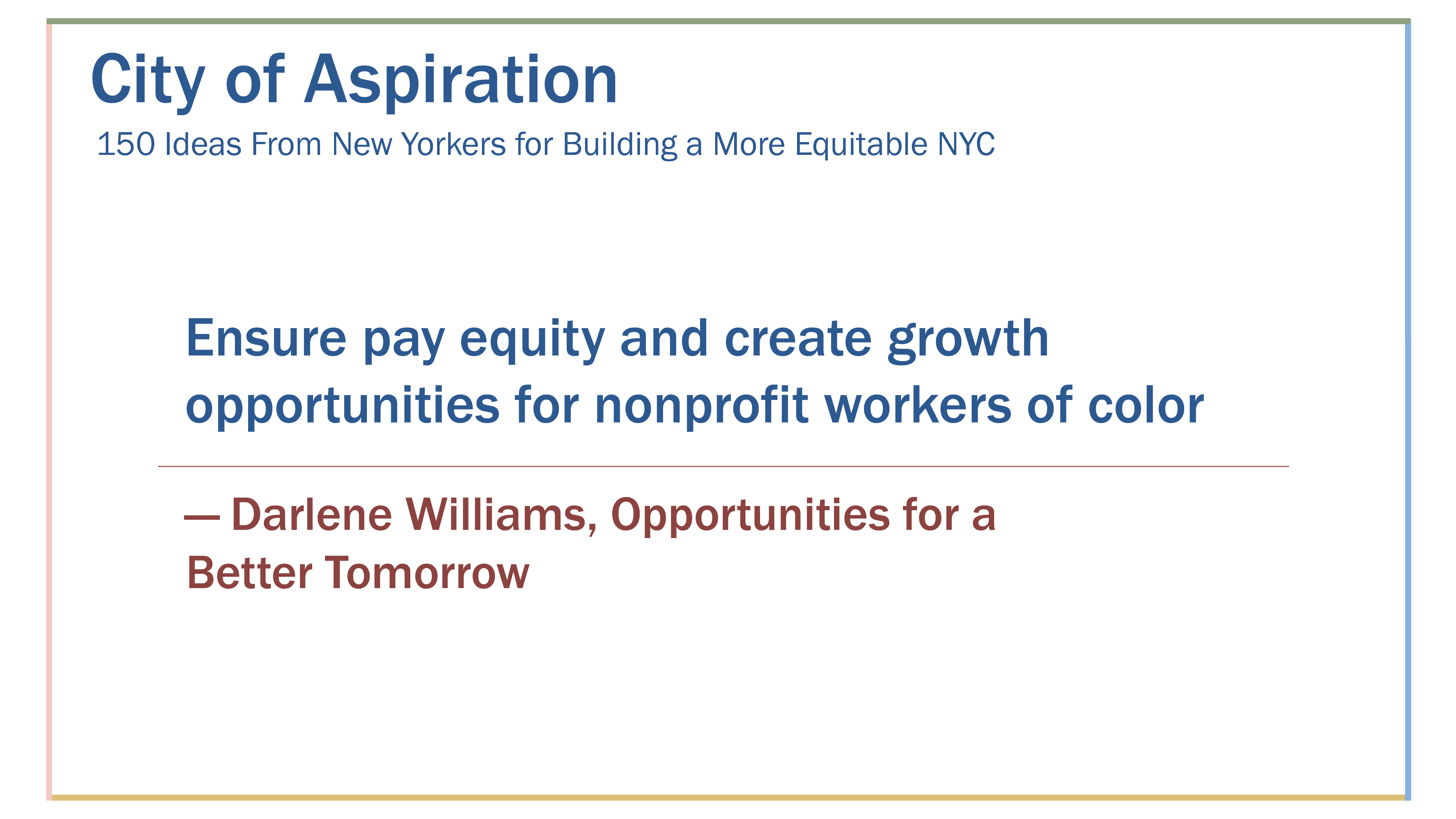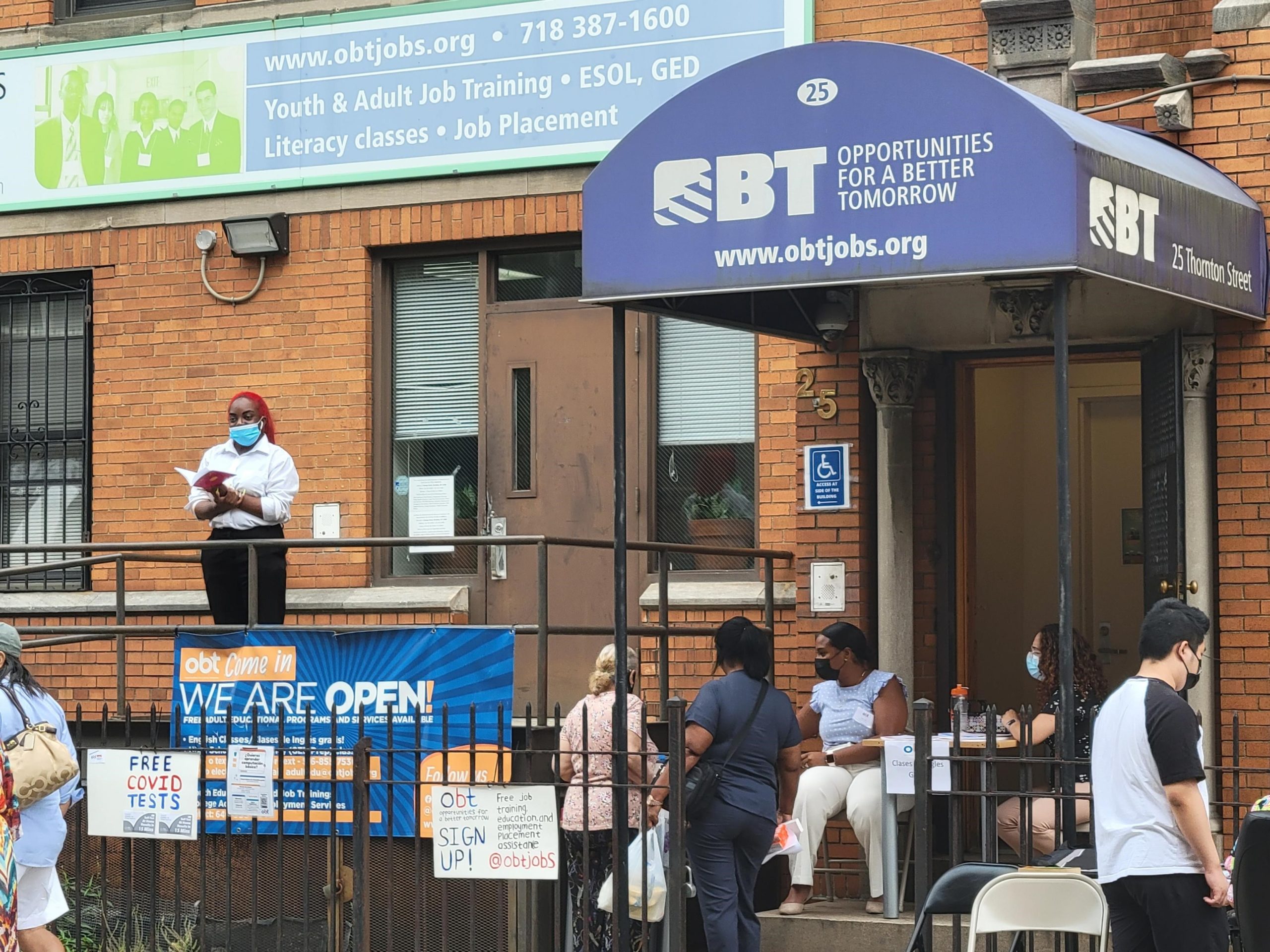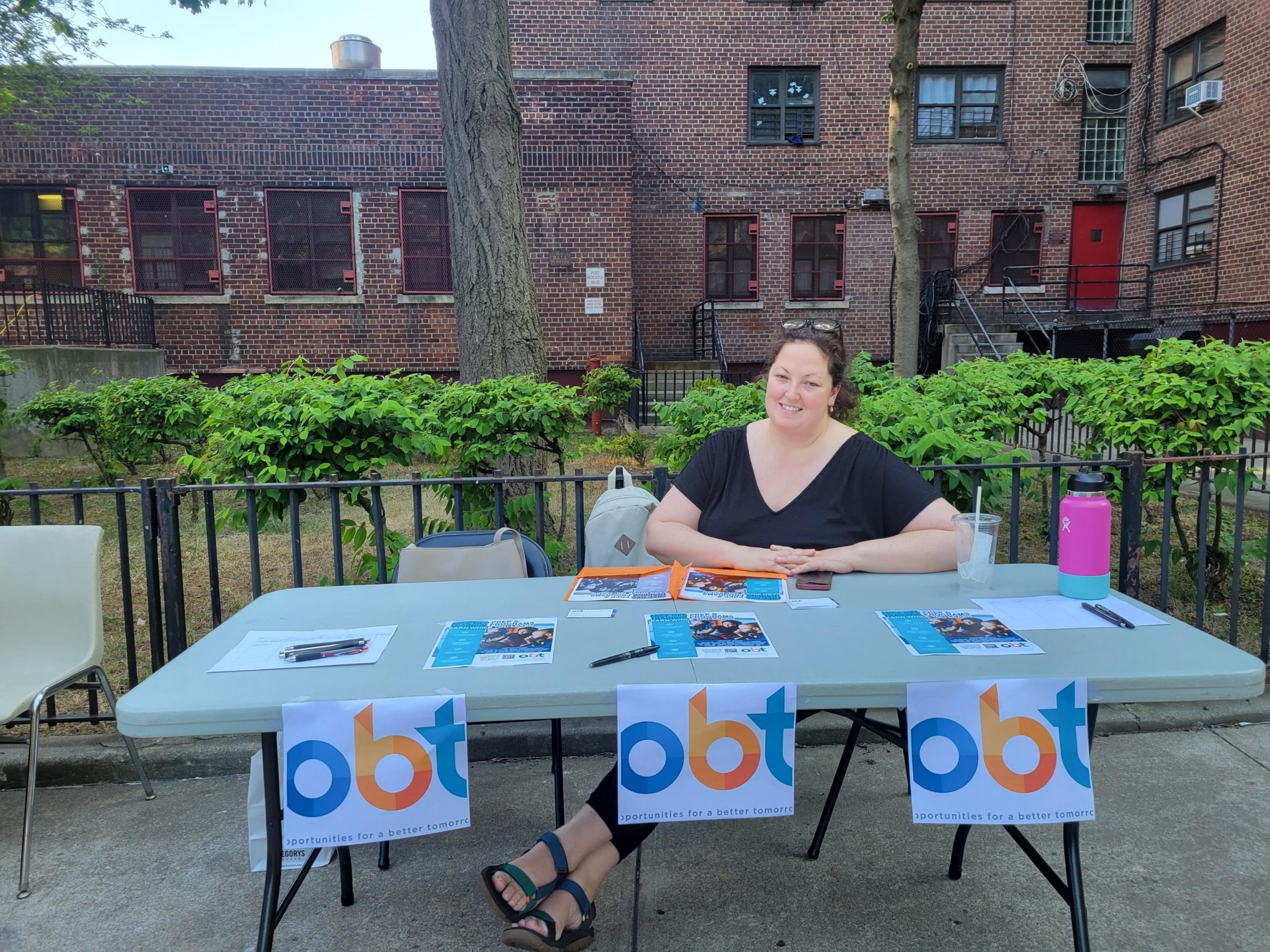Testimony of Dr. Liliana Polo-Mckenna, Chief Executive Officer
Opportunities for a Better Tomorrow (OBT)
Good morning. My name is Liliana Polo-Mckenna and I am the Chief Executive Officer at Opportunities for a Better Tomorrow (OBT). Thank you to the members of the Council for the opportunity to speak today. I am here to discuss the crisis facing New York City’s young adults and the opportunities we must act on now to support them.
Founded in 1983, OBT is one of New York City’s largest providers of workforce development and education services for opportunity youth, ages 17-24, and adults who are disconnected from education and/or employment. OBT serves over 4,000 youth and adults annually across sites in Brooklyn and Queens. We exist to break the cycle of poverty and inequity through education, job training, and employment. OBT’s programs serve as a bridge to economic opportunity for youth, individuals, and families in underserved communities. With programming that ranges from high school equivalency to ESOL courses to industry-certified training programs for high school graduates, we focus on meeting individuals “where they are” and work with them to meet their goals. Our programs have an 87% completion rate. 72% of participants earn employer-recognized credentials during their time with us and 70% are placed in jobs after graduating from our programs.
OBT During the Spread of COVID-19
COVID-19 has taken an incredible toll on our city. It has also had a disproportionate impact, and has been particularly devastating in low-income, Black and Brown communities. These are the very communities that OBT has served for decades. This disproportionate impact was felt in both lives and livelihoods, with economic difficulties hitting these communities hardest as well.
As we are rooted in the communities most impacted, we knew our services would be more critical than ever. There was no lapse in OBT’s programming; we shifted to remote programming, literally overnight. We navigated the technical issues, ensuring all students had access to the internet and had devices to attend class on. For over a year, OBT students have continued earning High School Equivalency diplomas, gaining certifications, networking with potential employers, and working in paid internships – all remotely and all during a time of incredible stress and uncertainty. We are extremely proud.
Some of what has facilitated this success is our team’s commitment to meeting our participants’ needs outside the classroom. OBT teams also picked up the mantle to support individuals with needs around food, diapers, everyday essentials, and keeping safe in the midst of this pandemic. We fundraised for an Emergency Fund that gave out over $66,000 to nearly 300 individuals and families in 2020. We are humbled to have been a lifeline for our participants and alumni.
Young People are in Crisis
Despite the resilience and hard work of organizations like OBT, New York City’s young people are in crisis. Since the pandemic hit New York City, the number of out of school and out of work young adults has more than doubled. For health, familial, economic reasons, or a combination of the three, young adults had to drop out of school or leave or be laid off from their jobs. The most recent research estimates that there are now between 257,000 and 310,000 young adults that fit this criterion now – compared to 110,000 in 2019. There have been times in the City when this population has been high – but there has never been a moment like this, when so much is stacked against young adults. Competition for jobs and shifted requirements to get hired and succeed in new and growing sectors are just some of what our participants and graduates are facing.
Young adults have borne the brunt of the economic fallout from the pandemic. The research is clear – young workers were 34% more likely to lose their jobs. Workers with a high school diploma or less were 12% more likely to be laid off. There are many reasons that this is the case. A significant reason is that young people represented the majority of workers in sectors that were particularly vulnerable to the pandemic’s shutdown – notably, retail and hospitality. A majority of these jobs are projected to not return.
How We Must Support Young Adults NOW
There are actions we can take right now to support young people facing increased competition for a shrinking number of employment opportunities. Organizations like OBT have been navigating these waters for decades. And over the past year, we and other workforce development nonprofits and advocacy organizations have put forth concrete solutions that can mitigate this crisis. Below, we outline some of the short and long term ways to address young people’s needs and build NYC’s economy back.
Short Term: Support What Works
- Expand training programs in high growth sectors, like tech, healthcare, and the green economy. We know where opportunities will be; we need the funding to innovate training programs alongside employers that can upskill New Yorkers into them.
- Expanding bridge programming, so that advanced training programs in high growth sectors are accessible to New Yorkers who are struggling. Bridge programming prepares an individual to succeed in more advanced training programs, this includes contextualized high school equivalency programming and a focus on digital literacy.
- Support paid Work-Based Learning (WBL) opportunities. Again and again, the research shows that internships and apprenticeships help young people not only build technical skills, but also learn the essential skills of how to navigate a workplace. Further, they’re able to augment their professional networks – which we all know is critical to getting hired.
- Ensure all programming includes wraparound supports. We cannot underscore this enough. None of these programs work if participants do not receive support for mental health support, food stipends, childcare vouchers, and transportation. This not only keep students engaged, but they make the difference between being able to participate – and improve their education – or not.
Long Term: Capitalize on System-wide Opportunities
Our solutions for NYC’s young people must be sustainable. Yes, we must support workforce development programs urgently now, but we also must attend to the systems change that will make this support longlasting. If the City isn’t paying attention to how workforce stakeholders – post-secondary institutions, employers, nonprofits, high schools – are working together to build pathways for young adults, we’re missing a critical opportunity to solve these seemingly intractable challenges.
We’re advocating for strengthening the connections between high schools and workforce training providers, and between workforce training providers and colleges. At OBT, our participants remind us that life isn’t linear. Building a career path isn’t either. A student may earn their high school diploma and go straight to getting their Bachelor’s degree. Or they may enroll in a job training program that prepares them for work. In a few years, they may realize that a college degree will propel them in their field and matriculate in college. We need to recognize the varied paths that young adults take towards economic mobility. Then, we need to invest in making their navigation along their path seamless and supported.
New York City’s young adults are in crisis. With more than double the young people out of school and out of work than pre-pandemic, we need bold investments to get them on track to employment that pays a living wage – and allows them to achieve their dreams. It is our hope and our expectation that the City Council and the Administration reflects its values of equity and racial, social, and economic justice in a budget that places youth, immigrants, and those who have borne the brunt of the economic hardship of this pandemic at the center. Thank you for the opportunity to testify. With any questions, I can be reached at lpolo@obtjobs.org.
Testimony of Caroline Iosso, Director of Advocacy and Strategic Communication
Opportunities for a Better Tomorrow (OBT)
Good morning. My name is Caroline Iosso and I am the Director of Advocacy and Strategic Communication at Opportunities for a Better Tomorrow (OBT). Thank you to the members of the Council for the opportunity to speak today. I am here to discuss the crisis facing New York City’s young adults and the opportunities we must act on now to support them.
Founded in 1983, OBT is one of New York City’s largest providers of workforce development and education services for opportunity youth, ages 17-24, and adults who are disconnected from education and/or employment. OBT serves over 4,000 youth and adults annually across sites in Brooklyn and Queens. We exist to break the cycle of poverty and inequity through education, job training, and employment. OBT’s programs serve as a bridge to economic opportunity for youth, individuals, and families in underserved communities. With programming that ranges from high school equivalency to ESOL courses to industry-certified training programs for high school graduates, we focus on meeting individuals “where they are” and work with them to meet their goals. Our programs have an 87% completion rate. 72% of participants earn employer-recognized credentials during their time with us and 70% are placed in jobs after graduating from our programs.
OBT Participants
For nearly 40 years, OBT has served young people and adults who face systemic barriers to economic stability. Our participants often struggle with generational poverty, health and mental health issues, and food insecurity. Many are from immigrant, Black, and Brown communities and face the racism – structural and direct – that those identities engender every day. Our mission has always been to mitigate the inherent inequity in our economic ecosystem through supportive and comprehensive job training and education programs. When students come to us for their High School Equivalency diploma or a job training, they leave with skills, networks, mentors, friends, confidence, and renewed energy towards a vocation in life.
Before COVID-19 brought our City’s businesses to a halt, fueled mass layoffs, and threw our health and mental health support systems into flux, this work was challenging. For the reasons discussed above, our participants faced an often uphill battle to secure family-sustaining employment.
Now, this work is all the more challenging and urgent. With increased competition for jobs, young people are at a disadvantage in finding employment, facing an even steeper climb towards economic stability and mobility.
Young People are in Crisis
Despite the resilience and hard work of organizations like OBT, New York City’s young people are in crisis. Since the pandemic hit New York City, the number of out of school and out of work young adults has more than doubled. For health, familial, economic reasons, or a combination of the three, young adults had to drop out of school or leave or be laid off from their jobs. The most recent research estimates that there are now between 257,000 and 310,000 young adults that fit this criterion now – compared to 110,000 in 2019.
Young adults have borne the brunt of the economic fallout from the pandemic. The research is clear – young workers were 34% more likely to lose their jobs. Workers with a high school diploma or less were 12% more likely to be laid off. There are many reasons that this is the case. A significant reason is that young people represented the majority of workers in sectors that were particularly vulnerable to the pandemic’s shutdown – notably, retail and hospitality. A majority of these jobs are projected to not return.
OBT’s Vision for FY22
OBT’s job training and education programs and employment placement services have taken on a new urgency in light of this crisis. And we need more support to be able to meet the needs of the newly unemployed and disconnected.
As we plan for the coming year, OBT is focused in three areas:
Expand training programs in high growth sectors: Expanding sector-based advanced programs in healthcare and technology, where well-paying job opportunities continue to grow. These programs offer a critical next step for those who earn their high school diploma to build experience in paid internships, network with employers, and hone their skills.
- OBT’s Medical Administrative Assistant Program has seen a 200% increase in applications. We are hoping to expand this program to meet the need.
- OBT’s Cloud Support Engineering Program is excited to announce two new components that will make carving a career pathway easier for young adults.
- First, we’re building a Bridge Program into the course so that the program is more accessible to those with little experience or who have been out of school for a significant amount of time.
- Second, graduates of the program can now earn 12+ credits at CUNY School of Professional Studies – a semester for free!
Supporting Students with Work-Based Learning and Wraparound Supports as they work towards their High School Equivalency: A High School diploma remains the gatekeeper to living wage and stable employment. OBT’s programs provide professional development, the opportunity to earn certifications, paid internship experiences, and individual case management that helps young people and adults build career pathways. In addition to adding seats to our Youth High School Equivalency Program, we want to support more New Yorkers in achieving their HSEs.
- Spanish-speaking adults expressed a desire to earn their High School Equivalency Diplomas. We are hoping to meet this demand by launching an Adult Spanish High School Equivalency Program that will help them to take their next steps.
Building Digital Literacy into Every Educational and Workforce Programming: Digital literacy and basic technological skills are essential for all workers. The transition to remote has only further demonstrated the need to address the digital divide through city-wide broadband access and organization-wide initiatives, like ensuring that all ESOL and High School Equivalency classes include digital literacy.
Workforce Development as a Vehicle for Equitable Economic Relief – And A Way to Mitigate the Crisis Facing NYC’s Young Adults
Job training, education programs and employment placement services will continue to be essential resources to disenfranchised young people, adults struggling with the digital divide, and speakers of other languages. Supporting these services demonstrates a commitment to an equitable economic recovery.
As the City navigates economic recovery, we must center those who have borne the brunt of the economic fallout – young adults. The programs we are proud to provide are lifelines to our participants as they work to survive in the economic landscape that we’re facing. OBT and other workforce organizations need your support in this budget so that we can continue to help New Yorkers survive and thrive.
Thank you for the opportunity to speak. With any questions, I can be reached at ciosso@obtjobs.org.




